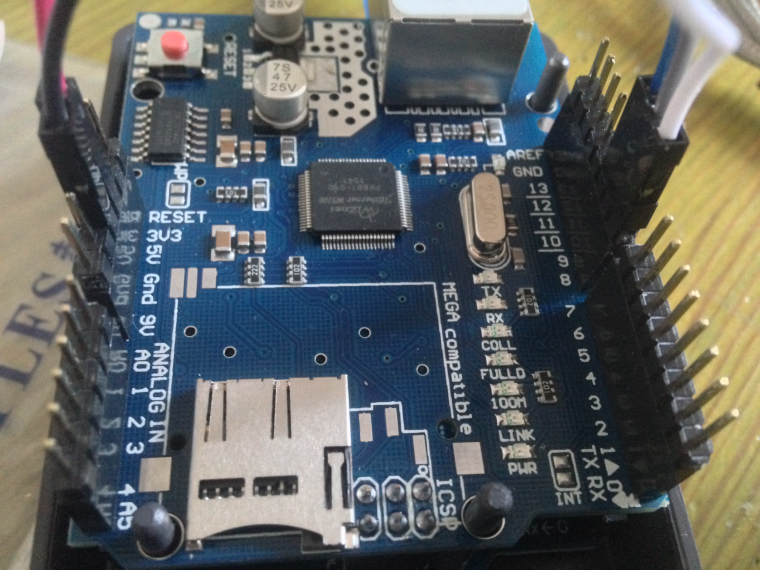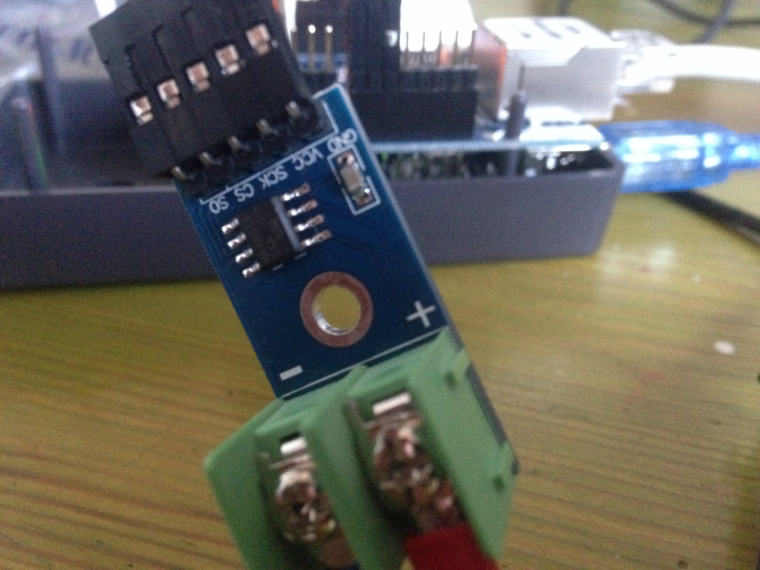Max6675 Thermocouple project
-
Hi, just started to explore the MySensors possibilities. The first project I'm building is a High temperature MAX6675 Thermocouple which send data to the MQTT broker.
So I ordered some parts and started building the gateway with an arduino uno and Ethernet shield. Than connected the Max6675 and gave it a go!
Although the set-up seems to be quit simple I can not get any temperature read from the sensor?
If I connect it like some of the samples I found I end up with this:0;255;3;0;9;MCO:BGN:INIT GW,CP=R-NGA--,VER=2.1.1 IP: 192.168.0.87 0;255;3;0;9;MCO:BGN:STP MAX6675 test 0;255;3;0;9;MCO:REG:NOT NEEDED 0;255;3;0;9;MCO:BGN:INIT OK,TSP=NA IP: 192.168.0.87 0;255;3;0;9;Attempting MQTT connection... 0;255;3;0;9;MQTT connected 0;255;3;0;9;Sending message on topic: mygateway1-out/0/255/0/0/17 0;255;3;0;9;Sending message on topic: mygateway1-out/0/255/3/0/11 0;255;3;0;9;Sending message on topic: mygateway1-out/0/255/3/0/12 0;255;3;0;9;Sending message on topic: mygateway1-out/0/10/0/0/6 Deg C = nan Deg F = nan Deg C = nan Deg F = nan Deg C = nan Deg F = nan Deg C = nan Deg F = nan Deg C = nan Deg F = nan Deg C = nan Deg F = nan Deg C = nan Deg F = nan Deg C = nan Deg F = nan Deg C = nan Deg F = nan Deg C = nan Deg F = nan Deg C = nan Deg F = nan Deg C = nan Deg F = nan Deg C = nan Deg F = nanI used this example for the wiring: link to max6675-temp-module-wiring
Also had a look at the post about the max6675 here on the forum. After trying several combinations I run out of ideas. So maybe one of you can point me in the right direction to get this finally working :)
This is the sketch I ended up after changing it several times.
/** * The MySensors Arduino library handles the wireless radio link and protocol * between your home built sensors/actuators and HA controller of choice. * The sensors forms a self healing radio network with optional repeaters. Each * repeater and gateway builds a routing tables in EEPROM which keeps track of the * network topology allowing messages to be routed to nodes. * * Created by Henrik Ekblad <henrik.ekblad@mysensors.org> * Copyright (C) 2013-2015 Sensnology AB * Full contributor list: https://github.com/mysensors/Arduino/graphs/contributors * * Documentation: http://www.mysensors.org * Support Forum: http://forum.mysensors.org * * This program is free software; you can redistribute it and/or * modify it under the terms of the GNU General Public License * version 2 as published by the Free Software Foundation. * ******************************* * * REVISION HISTORY * Version 1.0 - Henrik Ekblad * * DESCRIPTION * The W5100 MQTT gateway sends radio network (or locally attached sensors) data to your MQTT broker. * The node also listens to MY_MQTT_TOPIC_PREFIX and sends out those messages to the radio network * * LED purposes: * - To use the feature, uncomment WITH_LEDS_BLINKING in MyConfig.h * - RX (green) - blink fast on radio message recieved. In inclusion mode will blink fast only on presentation recieved * - TX (yellow) - blink fast on radio message transmitted. In inclusion mode will blink slowly * - ERR (red) - fast blink on error during transmission error or recieve crc error * * See http://www.mysensors.org/build/esp8266_gateway for wiring instructions. * nRF24L01+ ESP8266 * VCC VCC * CE GPIO4 * CSN/CS GPIO15 * SCK GPIO14 * MISO GPIO12 * MOSI GPIO13 * * Not all ESP8266 modules have all pins available on their external interface. * This code has been tested on an ESP-12 module. * The ESP8266 requires a certain pin configuration to download code, and another one to run code: * - Connect REST (reset) via 10K pullup resistor to VCC, and via switch to GND ('reset switch') * - Connect GPIO15 via 10K pulldown resistor to GND * - Connect CH_PD via 10K resistor to VCC * - Connect GPIO2 via 10K resistor to VCC * - Connect GPIO0 via 10K resistor to VCC, and via switch to GND ('bootload switch') * * Inclusion mode button: * - Connect GPIO5 via switch to GND ('inclusion switch') * * Hardware SHA204 signing is currently not supported! * * Make sure to fill in your ssid and WiFi password below for ssid & pass. */ // Enable debug prints to serial monitor #define MY_DEBUG // Enables and select radio type (if attached) //#define MY_RADIO_NRF24 //#define MY_RADIO_RFM69 #define MY_GATEWAY_MQTT_CLIENT // Set this node's subscribe and publish topic prefix #define MY_MQTT_PUBLISH_TOPIC_PREFIX "mygateway1-out" #define MY_MQTT_SUBSCRIBE_TOPIC_PREFIX "mygateway1-in" // Set MQTT client id #define MY_MQTT_CLIENT_ID "mysensors-1" // W5100 Ethernet module SPI enable (optional if using a shield/module that manages SPI_EN signal) //#define MY_W5100_SPI_EN 4 // Enable Soft SPI for NRF radio (note different radio wiring is required) // The W5100 ethernet module seems to have a hard time co-operate with // radio on the same spi bus. #if !defined(MY_W5100_SPI_EN) && !defined(ARDUINO_ARCH_SAMD) #define MY_SOFTSPI #define MY_SOFT_SPI_SCK_PIN 14 #define MY_SOFT_SPI_MISO_PIN 16 #define MY_SOFT_SPI_MOSI_PIN 15 #endif // When W5100 is connected we have to move CE/CSN pins for NRF radio #ifndef MY_RF24_CE_PIN #define MY_RF24_CE_PIN 5 #endif #ifndef MY_RF24_CS_PIN #define MY_RF24_CS_PIN 6 #endif // Enable these if your MQTT broker requires usenrame/password #define MY_MQTT_USER "" #define MY_MQTT_PASSWORD "" // Enable MY_IP_ADDRESS here if you want a static ip address (no DHCP) #define MY_IP_ADDRESS 192,168,0,87 // If using static ip you need to define Gateway and Subnet address as well #define MY_IP_GATEWAY_ADDRESS 192,168,0,1 #define MY_IP_SUBNET_ADDRESS 255,255,255,0 // MQTT broker ip address or url. Define one or the other. //#define MY_CONTROLLER_URL_ADDRESS "m20.cloudmqtt.com" #define MY_CONTROLLER_IP_ADDRESS 192, 168, 0, 36 // The MQTT broker port to to open #define MY_PORT 1883 /* // Enable inclusion mode #define MY_INCLUSION_MODE_FEATURE // Enable Inclusion mode button on gateway //#define MY_INCLUSION_BUTTON_FEATURE // Set inclusion mode duration (in seconds) #define MY_INCLUSION_MODE_DURATION 60 // Digital pin used for inclusion mode button //#define MY_INCLUSION_MODE_BUTTON_PIN 3 // Set blinking period #define MY_DEFAULT_LED_BLINK_PERIOD 300 // Flash leds on rx/tx/err // Uncomment to override default HW configurations //#define MY_DEFAULT_ERR_LED_PIN 16 // Error led pin //#define MY_DEFAULT_RX_LED_PIN 16 // Receive led pin //#define MY_DEFAULT_TX_LED_PIN 16 // the PCB, on board LED */ #include <Ethernet.h> #include <MySensors.h> // Sample Arduino MAX6675 Arduino Sketch #include "max6675.h" #define MY_NODE_ID 10 #define CHILD_ID_TEMP 10 #define TEMP_SENSOR_DIGITAL_PIN 8 int thermoSO = 8; int thermoCS = 9; int thermoSCLK = 10; MAX6675 thermo(thermoSCLK, thermoCS, thermoSO); int vccPin = 3; int gndPin = 2; MyMessage msg(CHILD_ID_TEMP, S_TEMP); void presentation() { // Send the sketch version information to the gateway and Controller sendSketchInfo("Temp Sensor", "0.1"); // Register all sensors to gateway (they will be created as child devices) present(CHILD_ID_TEMP, S_TEMP); } void setup() { Serial.begin(115200); // use Arduino pins pinMode(vccPin, OUTPUT); digitalWrite(vccPin, HIGH); pinMode(gndPin, OUTPUT); digitalWrite(gndPin, LOW); Serial.println("MAX6675 test"); // give the MAX a little time to settle delay(500); } void loop() { // basic readout test Serial.print("Deg C = "); Serial.print(thermo.readCelsius()); Serial.print("\t Deg F = "); Serial.println(thermo.readFahrenheit()); delay(500); }

